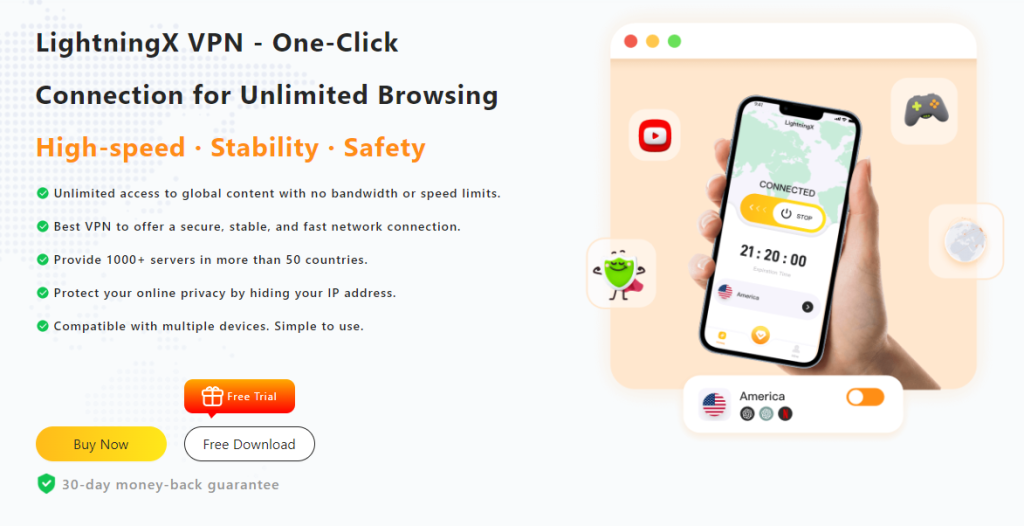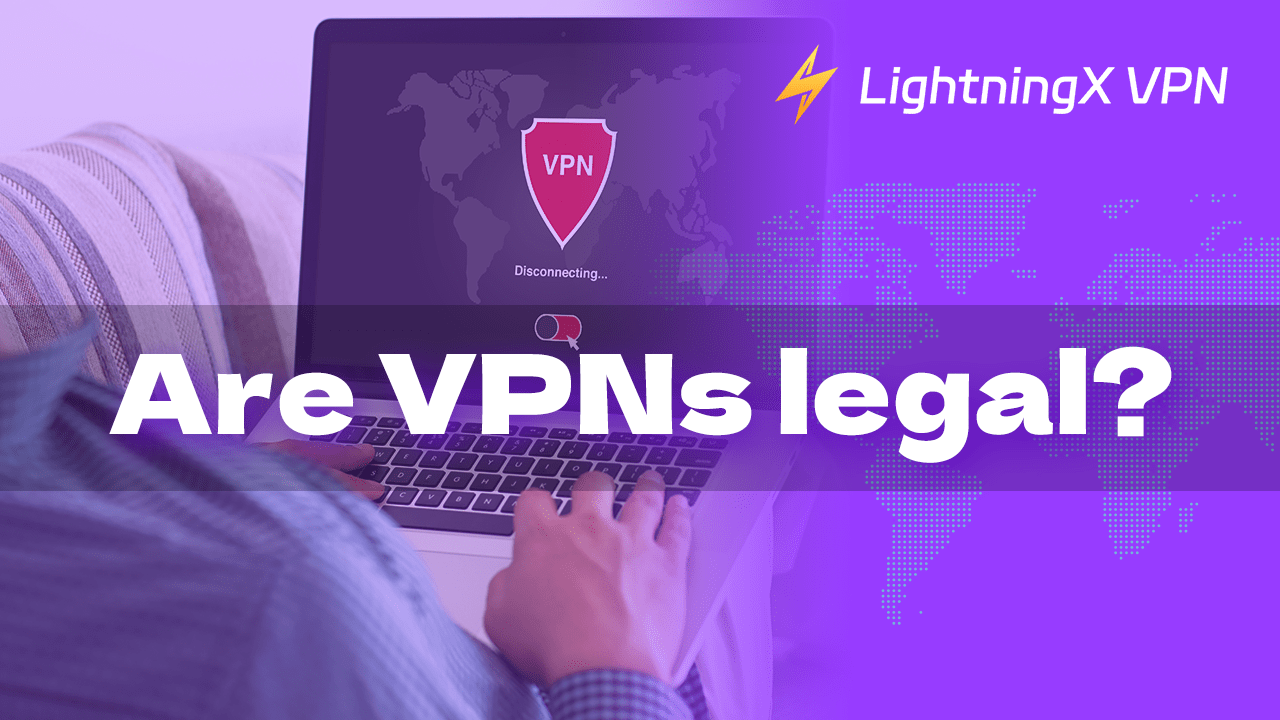Are VPNs legal? In countries like the US, UK, Canada, and Japan, VPNs are legal as long as they’re used for legitimate purposes, such as streaming, remote work, or online security. But in places like China or Russia, VPN usage is heavily restricted or even banned.
In this guide, we’ll explain where VPNs are legal or illegal, why some governments restrict them, and what you should know if you use a VPN for streaming or accessing foreign TV.
Are VPNs Legal?
Yes, VPNs are legal in most countries around the world. But if you are in a country that has banned/restricted the use of VPNs, then it can be a bit more complicated. There are a few main scenarios:
General Rules about VPN Legality
In many countries, including the United States, Canada, the United Kingdom, Japan, and much of Europe, using a VPN is perfectly legal. As long as you don’t engage in illegal activities, you can safely use a VPN for streaming, remote work, or protecting your online privacy.
VPN Restrictions and Bans
Some countries have strict regulations on the use of VPNs. For example, places like China and Russia only allow the use of government-approved VPNs. If you use an unapproved VPN there, you may get in trouble. While using a VPN itself may be legal, accessing restricted content is illegal.
Recently, Brazil has also restricted VPNs, and people who use VPNs to access social networks will be fined.
VPN Complete Bans
Some countries, such as Belarus and Iran, have completely banned the use of VPNs. In these places, using a VPN can result in severe penalties, including fines or even jail time.
Where are VPNs illegal?
1. Countries Where VPNs are Completely Banned
Is VPN illegal in North Korea?
North Korea has one of the strictest internet policies in the world. The government controls its citizens’ online activities and strictly prohibits using VPNs to ensure complete monitoring and control of information.
Is VPN illegal in Belarus?
VPNs and the Tor network have been banned since 2015. The government aims to control the flow of information to prevent the spread of potentially anti-government content. Users caught using VPNs face severe penalties, including fines and detention.
Is using a VPN illegal in Iraq?
VPNs were banned in 2014 to combat ISIS and restrict its communication channels. Although the main threat has diminished, restrictions on VPNs remain in place to maintain government control over internet use.
Is VPN illegal in Turkmenistan?
VPNs are banned in Turkmenistan. Turkmenistan has only one authorized internet provider, Turkmentelecom, which controls the entire flow of information and blocks content that the authorities do not want.
Is using a VPN illegal in Iran?
Only government-approved VPNs are allowed, and these are strictly monitored. The government uses these restrictions to control access to foreign websites and services, ensuring that only state-approved content is accessible.
2. Countries with Restricted VPN Use
China: You can only use government-approved VPNs, which means they can monitor your activity. The Great Firewall blocks most other VPN services.
Read more: 7 Best VPNs for China to Bypass the Great Firewall
Russia: Similar to China, only government-approved VPNs are allowed. In 2017, Russia passed a law requiring VPN providers to block access to government-banned websites. In 2019, further measures were taken to force VPN providers to comply with government data requests.
Tip: If you are traveling abroad and want to find a good VPN, we recommend LightningX VPN. Unlimited bandwidth, unlimited speed, up to 2000+ nodes, and multiple devices can be used simultaneously.
Download it for free now and easily access popular platforms around the world, such as Netflix, YouTube, TikTok, etc.
Turkey: VPNs are technically legal, but their use is limited to combating “terrorism.” Many VPN providers are blocked to prevent access to politically sensitive content. These restrictions have been implemented and tightened since the failed coup in 2016.
UAE: Using a VPN for illegal activities or to access blocked content can result in a hefty fine. The UAE uses vague laws to block VPN use, with fines of up to $136,129.
Oman: Using a personal VPN is illegal in Oman, and only government-approved VPNs are allowed. Unauthorized use can result in a fine.
India: VPNs are legal, but a 2022 law requires VPN providers to store user data for at least five years. This has led many VPN companies to shut down their servers in India to avoid compliance.
Egypt: VPNs are legal, but using them to access blocked content could get you in trouble. Since the 2011 revolution, the government has severely restricted internet use, and accessing restricted sites through a VPN can result in legal consequences.
Saudi Arabia: VPNs are not illegal, but using them to bypass internet censorship can result in jail time and fines of up to 500,000 Saudi riyals.
Uganda: VPNs are restricted because people use them to circumvent a social media tax introduced in 2018. The government blocks VPN providers to ensure compliance with this tax.
Venezuela: VPNs are legal, but the country has many internet restrictions. There have been attempts to restrict VPN use, especially during times of political unrest, to prevent people from accessing independent news and social media.
Why are VPNs Legally Problematic?
VPNs, or virtual private networks, provide privacy and security by encrypting internet connections. However, using them can sometimes lead to legal problems.
1. Government Control and Surveillance
- Information Control: Many governments want to control the flow of information within their borders. VPNs can bypass these controls, allowing users to access restricted or censored content.
- Surveillance: Governments may monitor internet activity for a variety of reasons, including national security and law enforcement. VPNs make it harder for governments to track people’s online activities.
2. Illegal Activity
- Cybercrime: VPNs can be used to hide illegal activities, such as hacking, fraud, and the distribution of illegal content. Using VPNs makes it harder for law enforcement to track cybercriminals.
- Piracy: VPNs can also be used to bypass geographic restrictions on content, leading to copyright infringement and piracy issues.
3. Economic Factors
- Tax Evasion: In some countries, VPNs are used to bypass local taxes on internet services, such as social media taxes. Governments restrict the use of VPNs to ensure that people comply with these tax laws.
- Market Control: Some countries want to protect local businesses and markets. Control access to foreign services and content by restricting VPNs.
4. National Security
- Terrorism: Terrorist groups use VPNs for covert communications, which can affect national security. Governments restrict VPN use to prevent such communications.
- Political Stability: In politically unstable countries, governments may restrict VPNs to prevent the spread of information that incites violence.
- Data Retention Laws: Some countries have laws that require ISPs to retain user data for a certain period of time. VPNs may not retain user data, thereby circumventing these laws.
Before using a VPN, always check the local laws in your area and understand the question “are VPNs legal” to ensure you’re staying within the law.
What is the Best VPN for Legal?
If your country allows VPNs or you are looking for a good VPN for traveling abroad, LightningX VPN is the first choice for a secure and reliable VPN service.

- Strong Encryption: LightningX VPN uses advanced encryption technology to protect users’ data.
- Strict No-Logs Policy: They maintain a strict no-logs policy, which means they don’t keep any records of your online activities.
- Global High-Speed Servers: LightningX VPN has a vast network of high-speed servers in more than 70 countries. You can stream your favorite shows, play games without lag or buffering.
- Bypass Geo-Restrictions: Traveling abroad often involves geo-restrictions on the internet. LightningX VPN allows you to bypass these restrictions and access your favorite content from anywhere in the world.
- Multi-Platform Support: Whether you’re using a Windows PC, Mac, iPhone, or Android device, LightningX VPN has you covered.
- 30-day Refund: LightningX VPN offers 3 free nodes and a 30-day unconditional refund.
Download LightningX VPN for free now and experience a safe, smooth, and legal Internet experience!
Disclaimer: Please note that using the LightningX VPN service for any illegal activity is strictly prohibited and violates our Terms of Service. Make sure to use LightningX VPN service for legal activities.
How Can Governments Detect VPN Usage?
While VPNs are designed to hide your real IP address and encrypt your data, some governments have developed advanced methods to detect VPN traffic. Here are the most common techniques used to identify or block VPN connections:
- Government-controlled VPNs: In some countries, only government-approved VPNs are allowed to operate. These VPNs log user activity and provide access to the government.
- Deep Packet Inspection (DPI): Deep Packet Inspection (DPI) is a technology that can inspect data transmitted over the Internet. Governments can use DPI to identify VPN traffic.
- Surveillance: Governments use advanced surveillance technology to monitor network traffic. They look for specific markers that indicate VPN usage. Many free VPNs are easily detected.
- National Firewalls: Countries like China use national firewalls to control Internet access and restrict web content. These firewalls can block access to VPN and proxy websites.
Therefore, it is important to pay attention to local laws and regulations when using VPNs.
Can I Get in Trouble Using a VPN?
Yes, if using a VPN is illegal in your country, you could get in trouble. Your Internet Service Provider (ISP) can see you using a VPN, even if they can’t see what you are doing online.
And some governments have ways to detect VPN usage through advanced technology.
To avoid getting in trouble for using a VPN, you can use a VPN with obfuscated servers, such as LightningX VPN. It makes your traffic look like normal internet traffic, making it harder for anyone to detect you using a VPN.
But remember, using a VPN for illegal activities is still legally punishable.
FAQ about Are VPNs Legal
1. Is using a VPN safe?
Yes, it is safe to use a VPN if you choose a high-quality, reputable VPN.
Quality VPNs have strong security features and no-logging policies. They do not track or store your online activities or real IP address, such as LightningX VPN. However, free VPNs may track your information and sell it to advertisers.
2. Is VPN legal in the U.S.?
Yes, it is legal to use a VPN in the United States.
There are currently no laws restricting or prohibiting the use of VPNs. However, using a VPN does not mean you can break the law.
3. Are VPNs legal in China?
In China, only government-approved VPNs are legal, and they are usually used for business purposes. Regular users may be exposed to legal risks when using VPNs in China.
If you want to visit China, please research local laws and considerations regarding VPNs.
4. Is VPN legal in India?
Yes, it is legal to use VPNs in India. However, new laws require VPN providers to store user data (such as IP addresses).
If you want to keep your online information private, consider using a good VPN with virtual servers outside of India.
5. Is VPN Legal in Canada?
Yes, it is legal to use VPNs in Canada. There are currently no specific laws prohibiting the use of VPNs in Canada.
6. Can VPN be tracked by the government?
Yes, the government can detect if you are using a VPN, and potentially track VPN traffic. But if the VPN has obfuscated encryption, they generally can’t see what you are doing online, or even detect that you are using a VPN.















